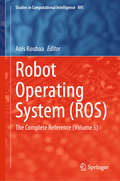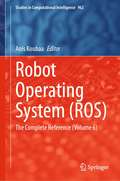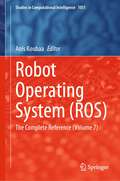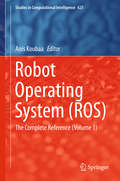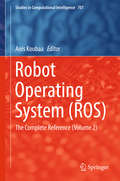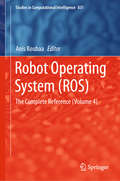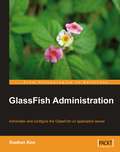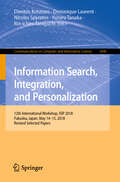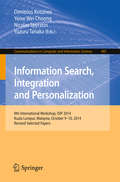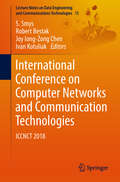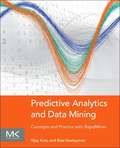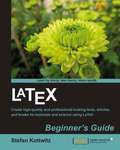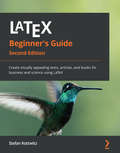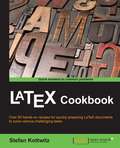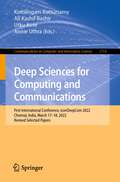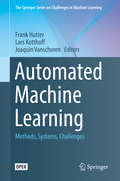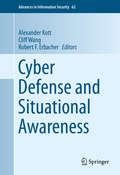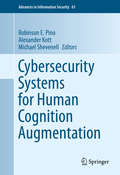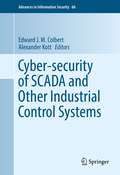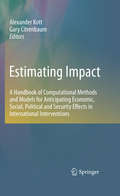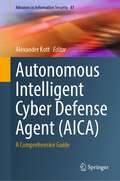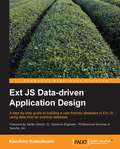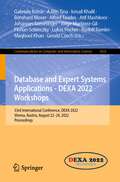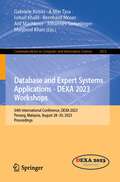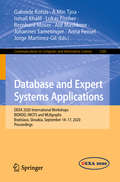- Table View
- List View
Robot Operating System: The Complete Reference (Volume 5) (Studies in Computational Intelligence #895)
by Anis KoubaaThis book is the fifth volume in the successful book series Robot Operating System: The Complete Reference. The objective of the book is to provide the reader with comprehensive coverage on the Robot Operating System (ROS), which is currently considered to be the primary development framework for robotics applications, and the latest trends and contributing systems. The content is divided into six parts. Pat I presents for the first time the emerging ROS 2.0 framework, while Part II focuses on multi-robot systems, namely on SLAM and Swarm coordination. Part III provides two chapters on autonomous systems, namely self-driving cars and unmanned aerial systems. In turn, Part IV addresses the contributions of simulation frameworks for ROS. In Part V, two chapters explore robotic manipulators and legged robots. Finally, Part VI presents emerging topics in monocular SLAM and a chapter on fault tolerance systems for ROS. Given its scope, the book will offer a valuable companion for ROS users and developers, helping them deepen their knowledge of ROS capabilities and features.
Robot Operating System: The Complete Reference (Volume 6) (Studies in Computational Intelligence #962)
by Anis KoubaaThis book is the sixth volume of the successful book series on Robot Operating System: The Complete Reference. The objective of the book is to provide the reader with comprehensive coverage of the Robot Operating Systems (ROS) and the latest trends and contributed systems. ROS is currently considered as the primary development framework for robotics applications. There are seven chapters organized into three parts. Part I presents two chapters on the emerging ROS 2.0 framework; in particular, ROS 2.0 is become increasingly mature to be integrated into the industry. The first chapter from Amazon AWS deals with the challenges that ROS 2 developers will face as they transition their system to be commercial-grade. The second chapter deals with reactive programming for both ROS1 and ROS. In Part II, two chapters deal with advanced robotics, namely on the usage of robots in farms, and the second deals with platooning systems. Part III provides three chapters on ROS navigation. The first chapter deals with the use of deep learning for ROS navigation. The second chapter presents a detailed tuning guide on ROS navigation and the last chapter discusses SLAM for ROS applications. I believe that this book is a valuable companion for ROS users and developers to learn more ROS capabilities and features.
Robot Operating System: The Complete Reference (Volume 7) (Studies in Computational Intelligence #1051)
by Anis KoubaaThis book is the seventh volume of the successful book series on Robot Operating System: The Complete Reference, which started in 2016. The book's objective is to provide the reader with comprehensive coverage on the Robot Operating Systems (ROS) and the latest trends and contributed systems. ROS has been considered as the primary development framework for robotics applications.There are seven chapters organized into three parts. Part I presents one chapter dealing with ROS2 and presents a tutorial on using the MediaPipe framework with ROS2. In Part II, three chapters present new contributions of ROS frameworks and applications, including micro-ROS, Autonomous 3D Thermal Mapping of Disaster Environments, and Lab-scale Smart Factory Implementation Using ROS. Part III provides contributions on how to use ROS for cooperative robotics behaviors, particularly in platoon applications, in addition to developing new perception and control algorithms with sensing technologies. This book will be a valuable companion for ROS users and developers to learn more about ROS capabilities and features.
Robot Operating System (ROS)
by Anis KoubaaThe objective of this book is to provide the reader with a comprehensive coverage on the Robot Operating Systems (ROS) and latest related systems, which is currently considered as the main development framework for robotics applications. The book includes twenty-seven chapters organized into eight parts. Part 1 presents the basics and foundations of ROS. In Part 2, four chapters deal with navigation, motion and planning. Part 3 provides four examples of service and experimental robots. Part 4 deals with real-world deployment of applications. Part 5 presents signal-processing tools for perception and sensing. Part 6 provides software engineering methodologies to design complex software with ROS. Simulations frameworks are presented in Part 7. Finally, Part 8 presents advanced tools and frameworks for ROS including multi-master extension, network introspection, controllers and cognitive systems. This book will be a valuable companion for ROS users and developers to learn more ROS capabilities and features.
Robot Operating System (ROS)
by Anis KoubaaThe objective of this book is to provide the reader with a comprehensive coverage on the Robot Operating Systems (ROS) and latest related systems, which is currently considered as the main development framework for robotics applications. The book includes twenty-seven chapters organized into eight parts. Part 1 presents the basics and foundations of ROS. In Part 2, four chapters deal with navigation, motion and planning. Part 3 provides four examples of service and experimental robots. Part 4 deals with real-world deployment of applications. Part 5 presents signal-processing tools for perception and sensing. Part 6 provides software engineering methodologies to design complex software with ROS. Simulations frameworks are presented in Part 7. Finally, Part 8 presents advanced tools and frameworks for ROS including multi-master extension, network introspection, controllers and cognitive systems. This book will be a valuable companion for ROS users and developers to learn more ROS capabilities and features.
Robot Operating System: The Complete Reference (Volume 4) (Studies in Computational Intelligence #831)
by Anis KoubaaThis is the fourth volume of the successful series Robot Operating Systems: The Complete Reference, providing a comprehensive overview of robot operating systems (ROS), which is currently the main development framework for robotics applications, as well as the latest trends and contributed systems. The book is divided into four parts: Part 1 features two papers on navigation, discussing SLAM and path planning. Part 2 focuses on the integration of ROS into quadcopters and their control. Part 3 then discusses two emerging applications for robotics: cloud robotics, and video stabilization. Part 4 presents tools developed for ROS; the first is a practical alternative to the roslaunch system, and the second is related to penetration testing. This book is a valuable resource for ROS users and wanting to learn more about ROS capabilities and features.
GlassFish Administration
by Xuekun KouThis book provides an in-depth tutorial on administering the GlassFish application server. Every chapter starts with a clear discussion of the involved concepts, followed by step-by-step instructions on how to perform the administrative task. Clear illustrations and complete working code examples are used to help you visualize the relevant topics. If you are a Java EE application developer and architect who builds and deploys Java EE, Ruby on Rails, and other supported applications for the GlassFish Application Server, then this book is for you. This book is also very valuable if you are an administrator responsible for maintaining the GlassFish Server runtime. Basic knowledge of Java EE 5 is assumed but you need not have any previous knowledge of GlassFish. Those who already know the basics of GlassFish will still find this book useful as they will gain knowledge of administration tasks.
Information Search, Integration, and Personalization: 12th International Workshop, ISIP 2018, Fukuoka, Japan, May 14–15, 2018, Revised Selected Papers (Communications in Computer and Information Science #1040)
by Dimitris Kotzinos Dominique Laurent Nicolas Spyratos Yuzuru Tanaka Rin-Ichiro TaniguchiThis book constitutes the revised selected papers of the 12th International Workshop on Information Search, Integration and Personalization, ISIP 2018, held in Fukuoka, Japan, in May 2018.The volume presents 1 invited paper as well as 7 revised full papers, which were carefully reviewed and selected from 13 papers submitted to these post-conference proceedings. The papers are organized in topical sections on data integration; text and document management; advanced data mining techniques.
Information Search, Integration and Personalization
by Dimitrios Kotzinos Yeow Wei Choong Nicolas Spyratos Yuzuru TanakaThis book constitutes the refereed post-proceedings of the 9th International Workshop on Information Search, Integration and Personalization, ISIP 2014, held in Kuala Lumpur, Malaysia, in October 2014. The 6 revised full papers and one invited papers presented were carefully reviewed and selected from 19 presentations. The papers are organized around the following topics: information search in large data sets (databases, digital libraries, data warehouses); comparison of different information search technologies, approaches, and algorithms; novel approaches to information search; personalized information retrieval and personalized web search; data analytics (data mining, data warehousing); integration of Web-services, knowledge bases, digital libraries; federation of smart objects.
International Conference on Computer Networks and Communication Technologies: Iccnct 2018 (Lecture Notes on Data Engineering and Communications Technologies #15)
by Ivan Kotuliak Joy Iong-Zong Chen Robert Bestak S. SmysThe book features research papers presented at the International Conference on Computer Networks and Inventive Communication Technologies (ICCNCT 2018), offering significant contributions from researchers and practitioners in academia and industry. The topics covered include computer networks, network protocols and wireless networks, data communication technologies, and network security. Covering the main core and specialized issues in the areas of next-generation wireless network design, control, and management, as well as in the areas of protection, assurance, and trust in information security practices, these proceedings are a valuable resource, for researchers, instructors, students, scientists, engineers, managers, and industry practitioners.
Predictive Analytics And Data Mining: Concepts And Practice With Rapidminer
by Vijay Kotu Bala DeshpandePut Predictive Analytics into Action Learn the basics of Predictive Analysis and Data Mining through an easy to understand conceptual framework and immediately practice the concepts learned using the open source RapidMiner tool. Whether you are brand new to Data Mining or working on your tenth project, this book will show you how to analyze data, uncover hidden patterns and relationships to aid important decisions and predictions. Data Mining has become an essential tool for any enterprise that collects, stores and processes data as part of its operations. This book is ideal for business users, data analysts, business analysts, business intelligence and data warehousing professionals and for anyone who wants to learn Data Mining. You'll be able to: 1. Gain the necessary knowledge of different data mining techniques, so that you can select the right technique for a given data problem and create a general purpose analytics process. 2. Get up and running fast with more than two dozen commonly used powerful algorithms for predictive analytics using practical use cases. 3. Implement a simple step-by-step process for predicting an outcome or discovering hidden relationships from the data using RapidMiner, an open source GUI based data mining tool Predictive analytics and Data Mining techniques covered: Exploratory Data Analysis, Visualization, Decision trees, Rule induction, k-Nearest Neighbors, Na ve Bayesian, Artificial Neural Networks, Support Vector machines, Ensemble models, Bagging, Boosting, Random Forests, Linear regression, Logistic regression, Association analysis using Apriori and FP Growth, K-Means clustering, Density based clustering, Self Organizing Maps, Text Mining, Time series forecasting, Anomaly detection and Feature selection. Implementation files can be downloaded from the book companion site at www.LearnPredictiveAnalytics.com Demystifies data mining concepts with easy to understand language Shows how to get up and running fast with 20 commonly used powerful techniques for predictive analysis Explains the process of using open source RapidMiner tools Discusses a simple 5 step process for implementing algorithms that can be used for performing predictive analytics Includes practical use cases and examples
LaTeX Beginner's Guide
by Stefan KottwitzPacked with fully explained examples, LaTeX Beginner's Guide is a hands-on introduction quickly leading a novice user to professional-quality results. If you are about to write mathematical or scientific papers, seminar handouts, or even plan to write a thesis, then this book offers you a fast-paced and practical introduction. Particularly during studying in school and university you will benefit much, as a mathematician or physicist as well as an engineer or a humanist. Everybody with high expectations who plans to write a paper or a book will be delighted by this stable software.
LaTeX Beginner's Guide: Create visually appealing texts, articles, and books for business and science using LaTeX, 2nd Edition
by Stefan KottwitzHarness the power of LaTeX and its wide range of features to create professional-looking text, articles, and books with both online and offline capabilities of LaTeXKey FeaturesGet a hands-on introduction to LaTeX using fully explained examples to advance from beginner to LaTeX professional quicklyWrite impressive mathematical, scientific, and business papers or theses using LaTeXExplore LaTeX onlineBook DescriptionLaTeX is high-quality open source typesetting software that produces professional prints and PDF files. It's a powerful and complex tool with a multitude of features, so getting started can be intimidating. However, once you become comfortable with LaTeX, its capabilities far outweigh any initial challenges, and this book will help you with just that! The LaTeX Beginner's Guide will make getting started with LaTeX easy. If you are writing mathematical, scientific, or business papers, or have a thesis to write, this is the perfect book for you. With the help of fully explained examples, this book offers a practical introduction to LaTeX with plenty of step-by-step examples that will help you achieve professional-level results in no time. You'll learn to typeset documents containing tables, figures, formulas, and common book elements such as bibliographies, glossaries, and indexes, and go on to manage complex documents and use modern PDF features. You'll also get to grips with using macros and styles to maintain a consistent document structure while saving typing work. By the end of this LaTeX book, you'll have learned how to fine-tune text and page layout, create professional-looking tables, include figures, present complex mathematical formulas, manage complex documents, and benefit from modern PDF features.What you will learnMake the most of LaTeX's powerful features to produce professionally designed textsDownload, install, and set up LaTeX and use additional styles, templates, and toolsTypeset math formulas and scientific expressions to the highest standardsUnderstand how to include graphics and work with figures and tablesDiscover professional fonts and modern PDF featuresWork with book elements such as bibliographies, glossaries, and indexesTypeset documents containing tables, figures, and formulasWho this book is forIf you are about to write mathematical or scientific papers, seminar handouts, or even plan to write a thesis, this book offers you a fast-paced and practical introduction to LaTeX. School and university students will find this easy-to-follow LaTeX guide helpful, as will mathematicians, physicists, engineers, and humanists. Anybody with high expectations from their software will discover how easy it is to leverage LaTeX's high performance for creating documents.
LaTeX Cookbook
by Stefan KottwitzOver 100 hands-on recipes to quickly prepare LaTeX documents of various kinds to solve challenging tasksAbout This BookWork with modern document classes, such as KOMA-Script classesExplore the latest LaTeX packages, including TikZ, pgfplots, and biblatexAn example-driven approach to creating stunning graphics directly within LaTeXWho This Book Is ForIf you already know the basics of LaTeX and you like to get fast, efficient solutions, this is the perfect book for you. If you are an advanced reader, you can use this book's example-driven format to take your skillset to the next level. Some familiarity with the basic syntax of LaTeX and how to use the editor of your choice for compiling is required.What You Will LearnChoose the right document class for your project to customize its featuresUtilize fonts globally and locallyFrame, shape, arrange, and annotate imagesAdd a bibliography, a glossary, and an indexCreate colorful graphics including diagrams, flow charts, bar charts, trees, plots in 2d and 3d, time lines, and mindmapsSolve typical tasks for various sciences including math, physics, chemistry, electrotechnics, and computer scienceOptimize PDF output and enrich it with meta data, annotations, popups, animations, and fill-in fieldsExplore the outstanding capabilities of the newest engines and formats such as XeLaTeX, LuaLaTeX, and LaTeX3In DetailLaTeX is a high-quality typesetting software and is very popular, especially among scientists. Its programming language gives you full control over every aspect of your documents, no matter how complex they are. LaTeX's huge amount of customizable templates and supporting packages cover most aspects of writing with embedded typographic expertise.With this book you will learn to leverage the capabilities of the latest document classes and explore the functionalities of the newest packages.The book starts with examples of common document types. It provides you with samples for tuning text design, using fonts, embedding images, and creating legible tables. Common document parts such as the bibliography, glossary, and index are covered, with LaTeX's modern approach.You will learn how to create excellent graphics directly within LaTeX, including diagrams and plots quickly and easily.Finally, you will discover how to use the new engines XeTeX and LuaTeX for advanced programming and calculating with LaTeX.The example-driven approach of this book is sure to increase your productivity.Style and approachThis book guides you through the world of LaTeX based on over a hundred hands-on examples. These are explained in detail and are designed to take minimal time and to be self-compliant.
Deep Sciences for Computing and Communications: First International Conference, IconDeepCom 2022, Chennai, India, March 17–18, 2022, Revised Selected Papers (Communications in Computer and Information Science #1719)
by Kottilingam Kottursamy Ali Kashif Bashir Utku Kose Annie UthraThis book constitutes selected papers presented during the First International Conference on Deep Sciences for Computing and Communications, IconDeepCom 2022, held in Chennai, India, in March 2022.The 27 papers presented were thoroughly reviewed and selected from 97 submissions. They are organized in topical sections as follows: classification and regression problems for communication paradigms; deep learning and vision computing; deep- recurrent neural network (RNN) for industrial informatics; extended AI for heterogeneous edge.
Automated Machine Learning: Methods, Systems, Challenges (The Springer Series on Challenges in Machine Learning)
by Lars Kotthoff Joaquin Vanschoren Frank HutterThis open access book presents the first comprehensive overview of general methods in Automated Machine Learning (AutoML), collects descriptions of existing systems based on these methods, and discusses the first series of international challenges of AutoML systems. The recent success of commercial ML applications and the rapid growth of the field has created a high demand for off-the-shelf ML methods that can be used easily and without expert knowledge. However, many of the recent machine learning successes crucially rely on human experts, who manually select appropriate ML architectures (deep learning architectures or more traditional ML workflows) and their hyperparameters. To overcome this problem, the field of AutoML targets a progressive automation of machine learning, based on principles from optimization and machine learning itself. This book serves as a point of entry into this quickly-developing field for researchers and advanced students alike, as well as providing a reference for practitioners aiming to use AutoML in their work.
Cyber Defense and Situational Awareness (Advances in Information Security #62)
by Alexander Kott Cliff Wang Robert F. ErbacherThis book is the first publication to give a comprehensive, structured treatment to the important topic of situational awareness in cyber defense. It presents the subject in a logical, consistent, continuous discourse, covering key topics such as formation of cyber situational awareness, visualization and human factors, automated learning and inference, use of ontologies and metrics, predicting and assessing impact of cyber attacks, and achieving resilience of cyber and physical mission. Chapters include case studies, recent research results and practical insights described specifically for this book. Situational awareness is exceptionally prominent in the field of cyber defense. It involves science, technology and practice of perception, comprehension and projection of events and entities in cyber space. Chapters discuss the difficulties of achieving cyber situational awareness - along with approaches to overcoming the difficulties - in the relatively young field of cyber defense where key phenomena are so unlike the more conventional physical world. Cyber Defense and Situational Awareness is designed as a reference for practitioners of cyber security and developers of technology solutions for cyber defenders. Advanced-level students and researchers focused on security of computer networks will also find this book a valuable resource.
Cybersecurity Systems for Human Cognition Augmentation (Advances in Information Security #61)
by Alexander Kott Robinson E. Pino Michael ShevenellThis book explores cybersecurity research and development efforts, including ideas that deal with the growing challenge of how computing engineering can merge with neuroscience. The contributing authors, who are renowned leaders in this field, thoroughly examine new technologies that will automate security procedures and perform autonomous functions with decision making capabilities. To maximize reader insight into the range of professions dealing with increased cybersecurity issues, this book presents work performed by government, industry, and academic research institutions working at the frontier of cybersecurity and network sciences. Cybersecurity Systems for Human Cognition Augmentation is designed as a reference for practitioners or government employees working in cybersecurity. Advanced-level students or researchers focused on computer engineering or neuroscience will also find this book a useful resource.
Cyber-security of SCADA and Other Industrial Control Systems (Advances in Information Security #66)
by Alexander Kott Edward J. M. ColbertThis book provides a comprehensive overview of the fundamental security of Industrial Control Systems (ICSs), including Supervisory Control and Data Acquisition (SCADA) systems and touching on cyber-physical systems in general. Careful attention is given to providing the reader with clear and comprehensive background and reference material for each topic pertinent to ICS security. This book offers answers to such questions as: Which specific operating and security issues may lead to a loss of efficiency and operation? What methods can be used to monitor and protect my system? How can I design my system to reduce threats? This book offers chapters on ICS cyber threats, attacks, metrics, risk, situational awareness, intrusion detection, and security testing, providing an advantageous reference set for current system owners who wish to securely configure and operate their ICSs. This book is appropriate for non-specialists as well. Tutorial information is provided in two initial chapters and in the beginnings of other chapters as needed. The book concludes with advanced topics on ICS governance, responses to attacks on ICS, and future security of the Internet of Things.
Estimating Impact
by Alexander Kott Gary CitrenbaumVirtually all human endeavors can be analyzed and modeled and understood through computer-aided study, and that is very much at the core of operations research, game theory, and decision science. Understanding the potential impact of any action is critical to the success of that action, and in ESTIMATING IMPACT Alexander Kott and Gary Citrenbaum, with a stellar group of contributors, demonstrate how military or humanitarian interventions (or the decision not to intervene) can be rigorously analyzed beforehand and their likely impacts and ramifications predicted at levels appropriate to their scope. A wide range of modeling programs are available that support plan assessment and impact forecast, and they allow accurate prediction within an interdependent set of political, military, economic, social, information, and infrastructure systems, and experts involved in the use and development of these tools demonstrate how, when, and why they should be used.
Autonomous Intelligent Cyber Defense Agent: A Comprehensive Guide (Advances in Information Security #87)
by Alexander KottThis book offers a structured overview and a comprehensive guide to the emerging field of Autonomous Intelligent Cyber Defense Agents (AICA). The book discusses the current technical issues in autonomous cyber defense and offers information on practical design approaches. The material is presented in a way that is accessible to non-specialists, with tutorial information provided in the initial chapters and as needed throughout the book. The reader is provided with clear and comprehensive background and reference material for each aspect of AICA.Today’s cyber defense tools are mostly watchers. They are not active doers. They do little to plan and execute responses to attacks, and they don’t plan and execute recovery activities. Response and recovery – core elements of cyber resilience – are left to human cyber analysts, incident responders and system administrators. This is about to change. The authors advocate this vision, provide detailed guide to how such a vision can be realized in practice, and its current state of the art.This book also covers key topics relevant to the field, including functional requirements and alternative architectures of AICA, how it perceives and understands threats and the overall situation, how it plans and executes response and recovery, how it survives threats, and how human operators deploy and control AICA. Additionally, this book covers issues of testing, risk, and policy pertinent to AICA, and provides a roadmap towards future R&D in this field.This book targets researchers and advanced students in the field of cyber defense and resilience. Professionals working in this field as well as developers of practical products for cyber autonomy will also want to purchase this book.
Ext JS Data-driven Application Design
by Kazuhiro KotsutsumiAn in-depth tutorial that teaches you the basics of data-driven applications, and how to design and implement them using Ext JS.If you are an intermediate in Sencha Ext JS, "Ext JS Data-Driven Application Design" is the tutorial for you. You need to be familiar with JavaScript and have basic operational knowledge of MySQL. If you want to be able to systematically construct an application from the first step to implementation, this book will be useful for you.
Database and Expert Systems Applications - DEXA 2022 Workshops: 33rd International Conference, DEXA 2022, Vienna, Austria, August 22–24, 2022, Proceedings (Communications in Computer and Information Science #1633)
by Gabriele Kotsis A Min Tjoa Ismail Khalil Bernhard Moser Alfred Taudes Atif Mashkoor Johannes Sametinger Jorge Martinez-Gil Florian Sobieczky Lukas Fischer Rudolf Ramler Maqbool Khan Gerald CzechThis volume constitutes the refereed proceedings of the workshops held at the 33rd International Conference on Database and Expert Systems Applications, DEXA 2022, held in Vienna, Austria, in August 2022: The 6th International Workshop on Cyber-Security and Functional Safety in Cyber-Physical Systems (IWCFS 2022); 4th International Workshop on Machine Learning and Knowledge Graphs (MLKgraphs 2022); 2nd International Workshop on Time Ordered Data (ProTime2022); 2nd International Workshop on AI System Engineering: Math, Modelling and Software (AISys2022); 1st International Workshop on Distributed Ledgers and Related Technologies (DLRT2022); 1st International Workshop on Applied Research, Technology Transfer and Knowledge Exchange in Software and Data Science (ARTE2022). The 40 papers were thoroughly reviewed and selected from 62 submissions, and discuss a range of topics including: knowledge discovery, biological data, cyber security, cyber-physical system, machine learning, knowledge graphs, information retriever, data base, and artificial intelligence.
Database and Expert Systems Applications - DEXA 2023 Workshops: 34th International Conference, DEXA 2023, Penang, Malaysia, August 28–30, 2023, Proceedings (Communications in Computer and Information Science #1872)
by Gabriele Kotsis A Min Tjoa Ismail Khalil Bernhard Moser Atif Mashkoor Johannes Sametinger Maqbool KhanThis volume constitutes the refereed proceedings of the workshops held at the 34th International Conference on Database and Expert Systems Applications, DEXA 2023, held in Penang, Malaysia, in August 2023: The 7th International Workshop on Cyber-Security and Functional Safety in Cyber-Physical Systems, IWCFS 2023, and The 3rd International Workshop on AI System Engineering: Math, Modelling and Software, AISys2023. The 7 full papers and 3 short papers were thoroughly reviewed and selected from 20 submissions, and discuss a range of topics including: knowledge discovery, biological data, cyber security, cyber-physical system, machine learning, knowledge graphs, information retriever, data base, and artificial intelligence.
Database and Expert Systems Applications: DEXA 2020 International Workshops BIOKDD, IWCFS and MLKgraphs, Bratislava, Slovakia, September 14–17, 2020, Proceedings (Communications in Computer and Information Science #1285)
by Gabriele Kotsis A Min Tjoa Ismail Khalil Lukas Fischer Bernhard Moser Atif Mashkoor Johannes Sametinger Anna Fensel Jorge Martinez-GilThis volume constitutes the refereed proceedings of the three workshops held at the 31st International Conference on Database and Expert Systems Applications, DEXA 2020, held in September 2020: The 11th International Workshop on Biological Knowledge Discovery from Data, BIOKDD 2020, the 4th International Workshop on Cyber-Security and Functional Safety in Cyber-Physical Systems, IWCFS 2020, the 2nd International Workshop on Machine Learning and Knowledge Graphs, MLKgraphs2019. Due to the COVID-19 pandemic the conference and workshop were held virtually. The 10 papers were thoroughly reviewed and selected from 15 submissions, and discuss a range of topics including: knowledge discovery, biological data, cyber security, cyber-physical system, machine learning, knowledge graphs, information retriever, data base, and artificial intelligent.
